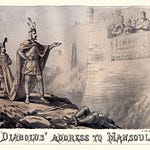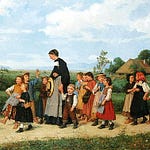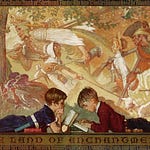Principle #9 (Feeding the Hungry Mind- spiritual organism)
”We hold that the child's mind is no mere sac to hold ideas; but is rather, if the figure may be allowed, a spiritual organism, with an appetite for all knowledge. This is its proper diet, with which it is prepared to deal; and which it can digest and assimilate as the body does foodstuffs.”
Modern education has two main goals: getting into college and preparing for a career. While these outcomes are desirable they ought not be our primary goals. College admittance and career readiness are byproducts-- not the focal points --of a classical Charlotte Mason education. This is because it is easy enough to stuff a child’s head with facts and information that they could easily retrieve from the latest AI assistant. However, our children are not machines. Which brings us to the current principle which states that the child’s mind, like the body, is a living organism designed to grow and flourish when nourished with rich ideas.
Children's minds grow, develop, and hunger just like their bodies. Both require food. The body needs what is material in the form of meat, vegetables, and fruit; the mind needs what is spiritual in the form of true, good, and beautiful ideas. But the problem we face today is that we treat children’s minds not like spiritual organisms but like machines. Computers can’t be curious and hungry for knowledge. Computers don’t have a sacred dignity that needs to be preserved and honored. Computers don’t have access to the educational work of the Holy Spirit. Children, on the other hand, are persons endowed with a mind, body, and soul. It is the work of education to see that we offer children what they need: great ideas that will feed, sustain and grow their minds.
In our technological world, we have so many replacements for the human mind that we must be on guard lest we forget how to help our children revere their humanity. The education we offer our children provides mental nourishment so they can become fully formed humans. We push back against the malformed child who can recite 6x6 but doesn’t know how to govern himself. The formation we seek offers a feast of ideas to nourish our children, preventing them from starving in a culture rich in materialism and entertainment. We want to feed their hungry minds.
The Hungry Mind
Children have a natural and innate hunger for knowledge. They are curious about everything. They wonder and notice the smallest details. Why is the sky blue? How does an airplane fly? Where does the salamander spend the winter? How does the baby get out of mommy’s belly? Children want to know how the world works and there is no end to their curiosity. But education can either honor this curiosity or stifle it.
We honor their curiosity by offering them great ideas to feed on. However, we must remember that while children are eager to learn, they are immature and need our guidance. Importantly, the child must do the learning for himself. We may not spoon feed, predigest, overplan, or come up with elaborate schemes that get in the way of our children coming into contact with ideas for themselves and making it their own.
How Do We Feed a Hungry Mind?
Just as the body requires nutritious food at regular intervals, the mind needs a rich and varied diet of ideas. These ideas can take three forms: something to think about, something to do, and someone to love.
1. Something to Think About: Offer children good books, myths, poems, history tales, and literature that challenge their minds and spark their imagination.
2. Something to Do: Engage children’s bodies and minds together through activities like nature outings, baking cookies, handcrafts, and drawing.
3. Someone to Love: Foster relationships with friends and family that provide opportunities for meaningful connection and growth.
Even the youngest children need to be fed with good ideas. A fussy toddler may simply be bored and in need of ideas to engage his mind and body. A story, a puzzle, a walk, or simple chores can help him feel a sense of belonging while nourishing his mind.
The Role of the Teacher
Let us return to the classroom where the teacher’s most important role in the eye’s of those in authority is to help the students score well on standardized tests. The focus is on measurable outcomes rather than on the child's character or the vitality of the ideas that are being offered. In this method, children are taught factoids, information, and testing strategies so that they can pass a test but lack the ability to think or govern themselves.
In a Charlotte Mason education, the teacher’s role is different. Mother-teachers are curators of ideas, the children feast on knowledge while the teacher fades into the background. The teacher ensures that the ideas are nourishing, makes adjustments as needed, and steps aside. In this method, the child’s dignity as a person is honored which allows him to grow and think for himself.
Mental Junk Food
Just as children need healthy, wholesome food, they also need to avoid the "junk food" of the mind: empty, shallow entertainment, and unchallenging information that can lead to stagnation.
Screen time, in particular, poses a challenge to parents seeking to cultivate the habit of attention and tuck worthy ideas into the hearts and minds of their children. The entertainment world offers mental “sugar,” encouraging children to disengage and simply consume. This is what Mason wanted to avoid with too much talk from the teacher: children who weren’t able to direct their own thoughts and actions because they’d become consumers. It is because passivity is so prominent that children need parents and teachers to cultivate a love of those ideas that are true, good, beautiful and worthy of the child’s time and attention.
A Healthy Mind
How can we tell if a child’s mind is well-nourished? The proof is in his actions and words. Parents and teachers who are engaged with a child don’t need a standardized test to determine if he is connecting with ideas and feeding on the feast set before him. The “proof is in the pudding”: children who are growing in character and learning to live well demonstrate with their lives that their education is nourishing.
Life Long Learners
Education is a lifelong endeavor. As we teach our children it is good to think about the end goal. What type of person do we hope they become? What skills, abilities, and affections do we hope they cultivate? Are these things learned and developed by chance or does education have a part to play in the hearts and minds of children?
It offends the sacredness of the dignity of the child to feed them nothing but facts and information in pursuit of good test scores. The child’s character is more precious than robotic test scores. Children are starved when taught this way. Their minds need to be nourished with the best ideas we can offer them.
As the body requires nourishing food, so does the mind need continuous intellectual 'meals' to grow, thrive, and mature. Our modern education system focuses on measurables—getting into college, landing a good job. But this does not cultivate thinking men and women who can govern themselves. We want more for our children. We can feed their minds because they are hungry for knowledge. This nourishment, tailored to their nature as spiritual organisms, will help grow our children beyond anything we can measure or imagine, as the child himself joins in the work of his own education.
---
How do I currently nourish my child’s mind beyond academics?
Something to think about?
Something to do?
Someone to love?
What are some things my child is (or has been) curious about? How did I help to encourage or discourage this curiosity?
How can I create a learning environment that nurtures my child’s mind as a "spiritual organism"?
During lessons do I focus more on the checklist or the process of helping my child grasp new ideas? (Reading lessons, history, science, geography, music, mathematics- each have different challenges for engaging the child. Which subjects have you seen this principle at play successfully? Which ones have opportunities for growth?)
Is there a habit getting in the way of my child cultivating a habit of attention so that he/she can engage more deeply with the ideas we are engaging with? (It is helpful to think of each subject specifically.)
20 Principles of a Liberating Education:
#2 The Good and Evil Nature of Children
#3 Parents are in Charge and Children Must Obey
#4 Limits to Our Authority as Parents and Educators
#5 Education is an Atmosphere, a Discipline, a Life| a primer
#9 Feeding the Hungry Mind (You are here)
Bibliography for further reading:
In Vital Harmony by Karen Glass
Start Here, a Journey through Mason’s 20 Principles by Brandy Vencel
Philosophy of Education by Charlotte Mason
Parents and Children by Charlotte Mason















Share this post